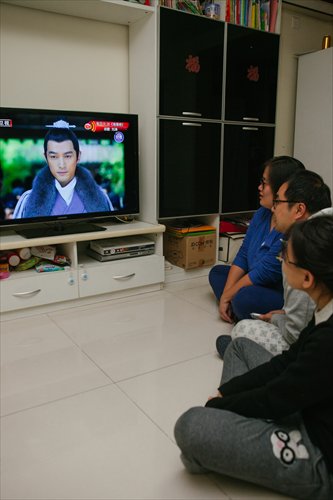Dawn of a golden age
Chinese TV dramas draw more and more fans

Good stories, refined production and effective publicity are three keys for the success of recent domestic TV series. Photo: Li Hao/GT
Wu Shan, a 19-year-old university student who calls herself a "TV series maniac," used to hate Chinese TV series and never watched one all the way through. As a student majoring in Broadcast Journalism and Television, Wu chose several older Chinese TV dramas in one of her papers to show how inferior Chinese TV series were to their Western counterparts last year.
Wu first became hooked to TV dramas when she saw the US series Prison Break (2008) the year it came out. "The intense suspense and good logic in the series almost made my heart jump out of my throat," said Wu. "But when I turned on the TV, the absurd and stupid domestic series with weird plot turns such as tearing a Japanese intruder apart with one's bare hands was a waste of time, so I gradually gave up hope on them."
However, she found a new passion since this August - the Chinese war spy drama The Disguiser (2015), and then Nirvana in Fire (2015), a story of revenge set in 4th century China. She watched both series twice through, something she had never done before. "Again I got that same feeling of excitement and anxiety as watching Prison Break," she said.
Wu is not alone in finding new Chinese domestic series attractive. According to a report by the People's Daily's website on September 29, several new TV series have rapidly won numerous fans. The Disguiser has drawn over 3.8 billion views on several major video websites in China, and Nirvana in Fire over 5.4 billion. The Journey of Flower (2015), a domestic TV drama based on a web fiction novel that was released in May, has drawn a record-high volume of more than 20 billion views.
Yun Feiyang, a movie critic with 100,000 followers on his Sina Weibo, said that Chinese mainland TV series are picking up momentum, but have still not hit their peak. He predicted a golden age of Chinese TV dramas is not far away.

Net series have become big-budget in China. Their success compares well with TV series. Photo: Li Hao/GT
Soaring popularity
Liu Bo, a TV series director, said the primary cause for Chinese mainland TV series attracting more fans lies in three aspects: the high quality of series production, online publicity, and good stories for the scripts.
According to a policy issued by the State Administration of Radio Film and Television, since this January, every TV series' first broadcast can only be on two satellite-TV channels instead of being allowed to be on four satellite-TV channels and several other local TV channels.
Liu said the policy largely cut down the numbers of series broadcast on all large TV channels, which has brought a reduction of TV series output, making the market more competitive. Also, TV channels have become more and more particular in choosing and buying TV series.
"Higher quality TV series are demanded by the market," said Liu.
He said the first method the producers turn to is to use new but skilled young actors. "Now an A-list actor's payment is frighteningly high, so some smart producers have begun to search for and use new, skilled actors and spend more money on production instead of wages."
Li Shihao, a media manager working at a Beijing-based promotional company, specializes in publicity for TV series and movies. He told Metropolitan that good publicity helps attract a huge number of fans.
Li said the publicity of a TV series starts before it is shot. By the time the crew is shooting the series, Li's company promotes stories about the series and makes them hot on the Internet.
"Most of the time we choose to carry out the publicity on Sina Weibo, which is an excellent stage of fast and effective media publicity," said Li.
According to Yun, the reason why there have been so many fans of recent domestic TV series is that these series are able to appeal to demographics with different tastes, and work on multiple levels.
"Since in China the middle class is growing, well-made and big budget series integrating serious drama and idol drama (featuring young, good looking actors) have wide appeal," said Yun. "The series are doing gradually better in going international, where they beat some of their foreign counterparts in winning fans, both domestic and overseas."



Stills of The Journey of Flower, WuXin: The Monster Killer (2015), and The Disguiser. Photos: CFP, IC
Chinese TV wins global fans
According to Yun, foreign shows are representative of their countries. For example, Sherlock (2014) and Downtown Abbey (2010), give a snapshot of periods of English history and made many people interested in British culture.
"The production process of Chinese series are similar to the foreign ones, since they are all based on a country's tradition and history," said Yun. "The story rules, so we must make better use of our traditional culture and history to produce more great stories."
Liu shares Yun's opinion. "Chinese people are good at several genres such as mythology, palace dramas, and history. They are unique in China, and easy to inspire scriptwriters." He said it would be weird for Chinese producers to touch on certain topics such as science fiction. "We have to admit that our national power and science is not as developed as some Western countries, and we lack the fact base to make series out of that. Mere imagination is not enough, and the audience will not buy it."
Zhang said another reason fans of American and British dramas began to watch domestic TV series is that the glimpse into Western life they offer is becoming less novel.
Domestic TV series are also attracting more foreign viewers. The show Nirvana in Fire has created a buzz on the TV drama forums like viki.com, attracting thousands of followers. Many foreign audiences expressed their love toward the series, commenting that the series is "a tastefully done Chinese period drama."
Internet dramas big success
Zhang Haobo, who directs dramas made exclusively for the Internet, said that Net dramas first appeared about seven years ago in China with low budgets. However, in recent years, Net dramas have won lots of fans with increasing quality and higher budgets, and compared well with TV series.
According to a recent Beijing News report, the increasingly developed Internet broadcasting infrastructure and business model have given Net series an outlet to be seen by the public. There were about 1,700 such Internet series produced in the Chinese mainland in 2014, and it is anticipated that the number in 2015 will be over 3,000.
The report said in 2016 and 2017, the investment in Net dramas will increase, with many big budget productions. Two seasons of Internet series adopted from the famous feng shui tomb raider fictional books, Guichuideng, or The Adventure of Three Tomb Raiders, will be available online. Additionally, Tencent, one of the largest Internet companies in China, will cooperate with Hong Kong's Television Broadcasts Limited in making an Internet series, the sequel of Line Walker (2014), a popular police and gangster TV series.
Zhang believes the future China's series, especially Net series, will be better and better with the development of social media and the Internet. He says that currently many cultural products follow a fast-food model, which suits the modern society's fast pace of development and benefits Net series.
"The key for Net series' success is to be short in length with good and interesting stories," said Zhang. "In the future, the cast will have more famous actors, and big-budget Net dramas are sure to be produced."
With the development of the Internet and the increasing dependence of Chinese audience on the Internet, Net series will enlarge its market proportion, said Zhang.
"Net series will definitely be the key point and future of Chinese drama series."